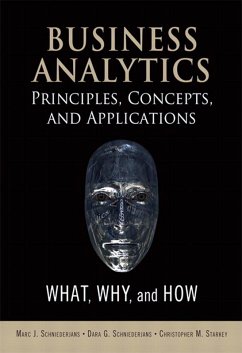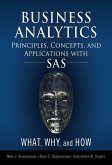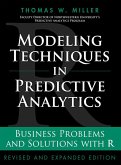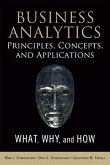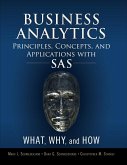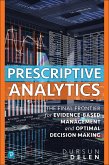Learn everything you need to know to start using business analytics and integrating it throughout your organization. Business Analytics Principles, Concepts, and Applications brings together a complete, integrated package of knowledge for newcomers to the subject. The authors present an up-to-date view of what business analytics is, why it is so valuable, and most importantly, how it is used. They combine essential conceptual content with clear explanations of the tools, techniques, and methodologies actually used to implement modern business analytics initiatives.
They offer a proven step-wise approach to designing an analytics program, and successfully integrating it into your organization, so it effectively provides intelligence for competitive advantage in decision making.
Using step-by-step examples, the authors identify common challenges that can be addressed by business analytics, illustrate each type of analytics (descriptive, prescriptive, and predictive), and guide users in undertaking their own projects. Illustrating the real-world use of statistical, information systems, and management science methodologies, these examples help readers successfully apply the methods they are learning.
Unlike most competitive guides, this text demonstrates the use of IBM's menu-based SPSS software, permitting instructors to spend less time teaching software and more time focusing on business analytics itself.
A valuable resource for all beginning-to-intermediate-level business analysts and business analytics managers; for MBA/Masters' degree students in the field; and for advanced undergraduates majoring in statistics, applied mathematics, or engineering/operations research.
They offer a proven step-wise approach to designing an analytics program, and successfully integrating it into your organization, so it effectively provides intelligence for competitive advantage in decision making.
Using step-by-step examples, the authors identify common challenges that can be addressed by business analytics, illustrate each type of analytics (descriptive, prescriptive, and predictive), and guide users in undertaking their own projects. Illustrating the real-world use of statistical, information systems, and management science methodologies, these examples help readers successfully apply the methods they are learning.
Unlike most competitive guides, this text demonstrates the use of IBM's menu-based SPSS software, permitting instructors to spend less time teaching software and more time focusing on business analytics itself.
A valuable resource for all beginning-to-intermediate-level business analysts and business analytics managers; for MBA/Masters' degree students in the field; and for advanced undergraduates majoring in statistics, applied mathematics, or engineering/operations research.
Dieser Download kann aus rechtlichen Gründen nur mit Rechnungsadresse in A, B, BG, CY, CZ, D, DK, EW, E, FIN, F, GR, HR, H, IRL, I, LT, L, LR, M, NL, PL, P, R, S, SLO, SK ausgeliefert werden.

